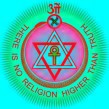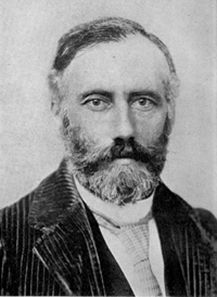The Writings of W Q Judge
An Epitome of Theosophy
By
William Q Judge
First published 1887
This
epitome was first issued as a Theosophical Tract by the
characterized
as "too advanced," giving as its opinion that what was needed was a
"stepping-stone from fiction to philosophy."
Mr. Judge
took exception to this view, vigorously urging that "strong lines of
action," directed toward spreading philosophical fundamentals, be adopted.
(His letter to the T. P. S. is the fourth in Book II of Letters That Have
first time,
from the Path. –Editors
THEOSOPHY, the
Wisdom-Religion, has existed from immemorial time. It
offers us a theory of
nature and of life which is founded upon knowledge acquired by the Sages of the
past, more especially those of the East; and its higher students claim that
this knowledge is not something imagined or inferred, but that it is seen and
known by those who are willing to comply with the conditions.
I. Some of its
fundamental propositions are:
1. That the spirit in
man is the only real and permanent part of his being; the rest of his nature
being variously compounded, and decay being incident to all composite things,
everything in man but his spirit is impermanent. Further, that the universe
being one thing and not diverse, and every thing within it being connected with
the whole and with every other, of which upon the upper plane above referred to
there is a perfect knowledge, no act or thought occurs without each portion of
the great whole perceiving and noting it. Hence all are inseparably bound
together by the tie of Brotherhood.
2. That below the spirit
and above the intellect is a plane of consciousness in which experiences are
noted, commonly called man's "spiritual nature"; this is as
susceptible of culture as his body or his intellect.
3. That this spiritual
culture is only attainable as the grosser interests, passions, and demands of
the flesh are subordinated to the interests, aspirations, and needs of the
higher nature; and that this is a matter of both system and established law.
4. That men thus
systematically trained attain to clear insight into the immaterial, spiritual
world, their interior faculties apprehending Truth as immediately and readily
as physical faculties grasp the things of sense, or mental faculties those of
reason; and hence that their testimony to such Truth is as trustworthy as is
that of scientists or
philosophers to truth in their respective fields.
5. That in the course of
this spiritual training such men acquire perception of and control over various
forces in Nature unknown to others, and thus are able to perform works usually
called "miraculous," though really but the result of larger knowledge
of natural law.
6. That their testimony
as to super-sensuous truth, verified by their possession of such powers,
challenges candid examination from every religious mind.
II. Turning now to the
system expounded by these Sages, we find as its main points:
1. An account of
cosmogony, the past and future of this earth and other planets, the evolution
of life through mineral, vegetable, animal, and human forms.
2. That the affairs of
this world and its people are subject to cyclic laws, and that during any one
cycle the rate or quality of progress appertaining to a different cycle is not
possible.
3. The existence of a
universally diffused and higher ethereal medium, called the "Astral
Light"(1) or "Akasa," which is the repository of all past,
present, and future events, and which records the effects of spiritual causes
and of all acts and thoughts from the direction of either spirit or matter. It
may be called the
Book of the Recording
Angel.
4. The origin, history,
development, and destiny of mankind.
III. Upon the subject of
Man it teaches:
1. That each spirit is a
manifestation of the One Spirit, and thus a part of all. It passes through a
series of experiences in incarnation, and is destined to ultimate re-union with
the Divine.
2. That this incarnation
is not single but repeated, each individuality becoming re-embodied during
numerous existences in successive races and planets, and accumulating the
experiences of each incarnation towards its perfection.
3. That between adjacent
incarnations, after grosser elements are first purged away, comes a period of
comparative rest and refreshment, the spirit being therein prepared for its
next advent into material life.
4. That the nature of
each incarnation depends upon the merit and demerit of the previous life or
lives, upon the way in which the man has lived and thought; and that this law
is inflexible and wholly just.
5. That "Karma," -- a term signifying two things, the
law of ethical causation (Whatsoever a man soweth,
that shall he also reap), and the balance or excess of merit or demerit in any
individual, determines also the main experiences of joy and sorrow in each
incarnation, so that what men call "luck" is in reality
"desert," -- desert acquired in past existence.
6. That the process of
evolution up to re-union with the Divine contemplates successive elevations
from rank to rank of power and usefulness, the most exalted beings still in the
flesh being known as Sages, Rishees, Brothers, Masters,
their great function being the preservation at all times, and -- when cyclic
laws permit -- the extension, of spiritual knowledge and influence among
humanity.
7. That when union with the Divine is
effected, all the events and experiences of each incarnation are known.
IV. As to the process of
spiritual development it teaches:
1. That the essence of
the process lies in the securing of supremacy to the highest, the spiritual,
element of man's nature.
2. That this is attained
along four lines, among others--
(a) The eradication of selfishness in all
forms, and the cultivation of broad, generous sympathy in and effort for the
good of others.
(b) The cultivation of
the inner, spiritual man by meditation, communion with the Divine, and
exercise.
(c) The control of
fleshly appetites and desires, all lower, material interests being deliberately
subordinated to the behests of the spirit.
(d) The careful
performance of every duty belonging to one's station in life, without desire
for reward, leaving results to Divine law.
3. That while the above
is incumbent on and practicable by all religiously-disposed men, a yet higher
plane of spiritual attainment is conditioned upon a specific course of
training, physical, intellectual, and spiritual, by which the internal
faculties are first aroused and then developed.
4. That an extension of
this process is reached in Adeptship, an exalted
stage, attained by laborious self-discipline and hardship, protracted through
possibly many incarnations, and with many degrees of initiation and preferment,
beyond which are yet other stages ever approaching the Divine.
V. As to the rationale
of spiritual development it asserts:
1. That the process is
entirely within the individual himself, the motive, the effort, the result
being distinctly personal.
2. That, however
personal and interior, this process is not unaided, being possible, in fact,
only through close communion with the Supreme Source of all strength.
VI. As to the degree of
advancement in incarnations it holds:
1. That even a mere
intellectual acquaintance with Theosophic truth has
great value in fitting the individual for a step upwards in his next
earth-life, as it gives an impulse in that direction.
2. That still more is
gained by a career of duty, piety, and beneficence.
3. That a still greater
advance is attained by the attentive and devoted use of the means to spiritual
culture heretofore stated.
VII. It may be added
that Theosophy is the only system of religion and philosophy which gives
satisfactory explanation of such problems as these:
1. The object, use, and
inhabitation of other planets than this earth.
2. The geological
cataclysms of earth; the frequent absence of intermediate types in its fauna;
the occurrence of architectural and other relics of races now lost, and as to
which ordinary science has nothing but vain conjecture; the nature of extinct
civilizations and the causes of their extinction; the persistence of savagery
and the unequal development of existing civilization; the differences, physical
and internal, between the various races of men; the line of future development.
3. The contrasts and
unisons of the world's faiths, and the common foundation underlying them all.
4. The existence of
evil, of suffering, and of sorrow -- a hopeless puzzle to the mere
philanthropist or theologian.
5. The inequalities in
social condition and privilege; the sharp contrasts between wealth and poverty,
intelligence and stupidity, culture and ignorance, virtue and vileness; the
appearance of men of genius in families destitute of it, as well as other facts
in conflict with the law of heredity; the frequent cases of unfitness
of environment around
individuals, so sore as to embitter disposition, hamper aspiration, and paralyse endeavor; the violent antithesis between character
and condition; the occurrence of accident, misfortune, and untimely death; --
all of them problems solvable only by either the conventional theory of Divine
caprice or the Theosophical doctrines of Karma and Re-incarnation.
6. The possession by
individuals of psychic powers -- clairvoyance, clairaudience, etc. -- as well
as the phenomena of psychometry and statuvolism.
7. The true nature of
genuine phenomena in spiritualism, and the proper antidote to superstition and
to exaggerated expectation.
8. The failure of
conventional religions to greatly extend their areas, reform abuses,
re-organize society, expand the idea of brotherhood, abate discontent, diminish
crime, and elevate humanity; and an apparent inadequacy to realize in
individual lives the ideal they professedly uphold.
Outline
of Basic Principles of Theosophy
For more info on Theosophy
Try these
Cardiff Theosophical Society meetings
are informal
and there’s always a cup of tea afterwards
The Cardiff Theosophical
Society Website
Dave’s Streetwise Theosophy Boards
If
you run a Theosophy Group then please
feel
free to use any material of this site
The National Wales Theosophy
Website
This
is for everybody not just people in Wales
Theosophy
Wales has a new structure as it separates into
independent
groups that run their own show
Theosophy Cardiff’s Instant Guide
High Drama & Worldwide Confusion
as Theosophy Cardiff Separates from the
Welsh Regional Association (formed 1993)
One
Liners & Quick Explanations
The Most Basic Theosophy Website in the
Universe
If you run a Theosophy Group
you can use
this as an introductory
handout
No
Aardvarks were harmed in the
Includes stuff about Marlon Brando,
Old cars,
Odeon Cinema Burnley, Heavy Metal, Wales,
Cups of Tea, Mrs Trellis of North Wales.
General pages about Wales,
Welsh History
and The History of Theosophy
in Wales
The
Spiritual Home of Urban Theosophy
The
Earth Base for Evolutionary Theosophy
An Outstanding
Introduction to Theosophy
By a student of
Katherine Tingley
Elementary Theosophy Who is the Man? Body and Soul
Body, Soul and Spirit Reincarnation Karma
Try these if you are
looking for a
local Theosophy
Group or Centre
UK Listing of Theosophical Groups
Worldwide Directory of Theosophical Links
___________________________________
General pages about Wales,
Welsh History
and The History of Theosophy
in Wales
Wales is a
Principality within the United Kingdom
and has an
eastern border with England.
The land area is
just over 8,000 square miles.
Snowdon in North Wales is the highest mountain at 3,650 feet.
The coastline is
almost 750 miles long.
The population of Wales as at the 2001 census is 2,946,200.



